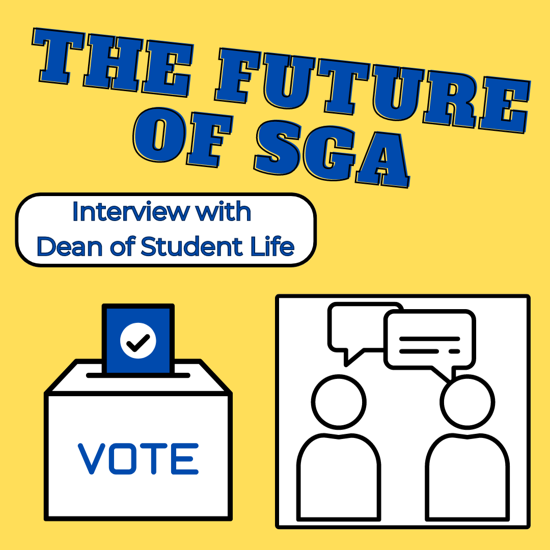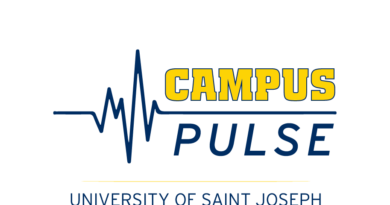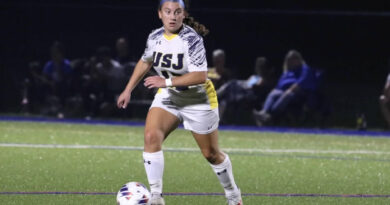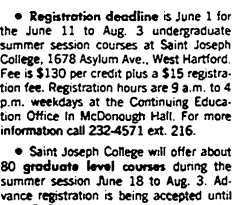The Future of USJ’s Student Government: An Interview with Dean of Student Life, Brandon Dawson
Interview conducted by Crista Fiala on April 17th, 2024
Transcription written by Samuel Turgeon
Over the last year, the USJ News Nest has been covering news concerning the Student Government Association. Topics included SGA’s absence from last fall’s club fair, the disbandment of the SGA senate, and interviews with members of the last executive board. In this interview with the Dean of Student Affairs, Crista Fiala asks questions about the future of SGA and the way in which it is currently being run. This interview was conducted on April 17, 2024.
Fiala: Going off of the article and some of the information I received from Syed and the other students, I guess I was a little bit confused and some of the other readers were confused. I think that Syed suggested that maybe they would get rid of the Senate in the future, and I know that there were some issues with student participation. Is that the direction that the senate is headed?
Dawson: So where that started is, one of the things we realized is, after the first year of looking at it, having senators attend became burdensome. We don’t have a common hour, so finding a time period where we can get a group of students to all be together without a financial penalty [is difficult]. Where I struggled is, if [a club rep] didn’t attend for [their club], there was a budget penalty potentially imposed on the club or organization for not attending. Which is really hard because we don’t have a block of time. Many universities have a common time or a common hour, between 11:00 to 12:00 on Mondays, Wednesdays, and Fridays, or Tuesdays and Thursdays, there’s no class. Then students have the ability to do some of these things during the day. Where I struggled was that we had a lot of clubs who just couldn’t have representation, or they were sending students to attend who just didn’t have the knowledge. [For example,] because News Nest needs somebody to go, you might’ve sent a writer who might not know as much as the board. It felt like a lot of times it was just a sharing of information. The times I went to senate, it was very much a ‘here’s what we’re doing, here’s what’s happening’. It was never a dialogue, it was never shared governance, it was never looking at things. When I brought Alex [Amoro] the concept of us renovating the bathrooms a year ago, that’s never been presented to them.
So that’s kind of where it started, this concept of ‘what is the purpose of shared governance?’ Student governance is shared governance. So, yes I would love to look at senate. I think there’s other ways we can have a senate. Whether it’s by class year, by school, by major. I’m not convinced that each club having an officer is the best route, and there are other models that can do that. [For example, having] each class year [have] two representatives, you have a commuter rep, you have a residential rep, you have an athletic rep, you have an honors rep. You find your communities that need to be represented in the senate. I think that’s better representation than having 20 clubs come together, because those 20 clubs might not actually represent the needs of the community, whereas if you have students that represent each class year and some of those other areas that need to be filled, [you achieve better representation].
So that’s where we started with Alex a year ago, and it’s just kind of spun because it’s theirs (SGA), so they were given opportunities last year to review multiple constitutions from other universities, how it works, and then trying to figure out what works here. The model that we are working on was taken from Eastern, Eastern Connecticut State University. It was just kind of a ‘drop and plop’, versus truly understanding the needs of our students, abilities of our students, and what we want from our students. That’s kind of the marching order that Jay [Henderson] gave, and then with Jay leaving I kind of jumped in to try to help SGA, but they never ran elections last year because Alex [Amoro] just kind of stopped. No harm to him, he just didn’t know where to go with it and it was just some leadership stuff. So that’s what we focused on in the fall, we ran elections in the fall. Elections are gonna run out for the spring, and then I think the goal for when we have a board in place is to understand how we want to maintain, what do we want to maintain? Do we want to maintain what the current constitution says, do we want to push out to the community that there’s a change?
I also would like to look at who gets to vote on things. I don’t think the senate should be the vote, I think every student should get a vote. When I was at Cornell, one cool thing about Cornell’s student assembly is that every student had a vote. Even if you weren’t part of the senate, if there was something the university was pushing or something SGA was pushing, everyone got a vote. So I think trying to figure out while we have a senate, who gets to vote. So it’s a lot to think about but also to try to understand what works here. The first was to get a board back in place to try to work with and develop their student government’s identity.
Fiala: So when you say ‘a board back in place’, do you mean the four main members?
Dawson: Our executive board, right.
Fiala: Do you mean also senate?
Dawson: Yeah. I think we do need an iteration of a senate. Right now the constitution refers to the ‘clubs and orgs’, so trying to figure out what is the best representation, and maybe it is clubs. I have a hard time penalizing clubs, I mean, you don’t get a lot of money to begin with, so I struggle with clubs being penalized, knowing it’s really hard to find an hour. That was my big struggle, I think working with whoever the new board is- I hired a new Associate Dean, one of his big charges is going to be helping student government redefine who they are, in a way that they truly represent students to the administration. Your job is to be that conduit, so that is one of the three tasks that he’s going to have, really working with student government over the summer and in the fall to bring student government back in a way where they are the voice of students to administration.
Fiala: Is there a plan in place right now to start moving that process along?
Dawson: We are in the process, we’re going to launch elections. And the hard part with the way our constitution’s written is who can run for what positions based upon responsibilities. So we’re going to launch that like we did in December. You know, we had a small number of students run, so Syed knows ‘before we graduate we have to run elections and put positions available and such and such.’ That is on them, I lean on them but I have to let them do that a little bit. So that’s where Syed and I have communicated about elections and officers.
Fiala: Do you guys meet all together, all four of you?
Dawson: So we do, I try to meet with them once a month just to kind of keep them moving. They did do their one open forum, I think they had thirty-something students come to attend that, which is really well done. Again, they’re trying to understand the needs of our students, cause I think they struggle, like we hear we want student government, but then we have vacant positions. Nobody ran. They’re trying to figure out how we get the community to participate, and I think it’s kind of this circle: students don’t want to participate if they feel there’s nothing coming from it. So I think it’s kind of built like a cycle.
It kind of reflects back, when I started I never saw student government actually delivering anything, it was more of a meeting. You learned about stuff and kind of talked about stuff, but there was never a ‘student government motion was passed to change the meal plan’, or ‘student government backs the university’s concept of gender inclusive housing or substance free housing’ or to weigh in on things. And that is kind of what I’m used to, so when I threw my opinion in two years ago, about what I felt like student government’s real role was, that’s where the beginning of this kind of shift was. I think you all should be involved. [For example,] If we’re gonna renovate the bathrooms, that should go to student government. Tell me: is this money well spent, what are your thoughts? And that just wasn’t what we were doing. That’s where the bottleneck started, I was just not used to a student government where the senate meetings were more like informative versus ‘tell us about the bathrooms, why are we doing gender inclusive bathrooms? Do we need gender inclusive bathrooms? Do we need gender inclusive housing? Why are building a baseball stadium? Why is there a change in my meal plan?’ Those are the things that I’m used to, additions of majors, like that is what I’m used to. So I own a little bit of it, as I kind of threw a little bit of a wrench to Jay [Henderson] when he was here, trying to figure out what shared governance means. So I’m going to own a little bit of this.
What was working was working, but I don’t know if it was working. Does that make sense? It was working in the sense that it flowed. People met. Information was shared. But I don’t know if it necessarily touched on the things that were really important, like we have a student activities fee. We’ve maintained the fee the same for five years now. Do we reduce? Do we increase? Where are we at with that? So student government voted on that, but then there’s never been a subsequent conversation: Is that enough, is that too much? Same thing with parking, those things. So that is really where I would love to see student government come in, and that’s one of the charges I’m giving to Sam [Johnson], being in follow-up in some of the conversations that we have about things that impact you and your life.
Fiala: That makes sense. For the senate elections, are you guys planning on holding that until next semester?
Dawson: I think for the Fall, and just in a sense, to A, get a better understanding of what’s needed. If you look at the constitution, the constitution says that we need a senate. We might have to run ‘em one year back with the normal process, to give us some time to see what works. I think this is one of the things I’m gonna ask Sam [Johnson] to work on, the new SGA rep, understanding the needs of student government, what do they need? But also we have to invest, making sure our officers get training, making sure we do club officer training, which you know, doesn’t happen. And then investing in organizations like ASGA, the association for student government administrators. Making sure our leadership gets to go to opportunities where they can learn and interact with other SGAs to make sure they’re doing the best they can.
Fiala: That sounds good. In the future, since you’re gonna hold elections for the senate, are you also going to hold elections for the whole board?
Dawson: So our goal is to get back into a cycle again, yes. The hard part is last year, last fall, the board didn’t hold anything, the four officers didn’t hold elections, which then put us in a very weird spot of being out of constitution, we’re defunct in a sense. So how do we just at least get that moving forward? The thought was Syed being in a role, kind of continued to run those elections, but that was one of the hard things. There was just no election done in April and May of last year.
Fiala: And I don’t think that the constitution says you have to do it in Spring or Fall, but for consistency…
Dawson: 100%, but also I would like to look at how we vote, like how we do elections. I think there’s platforms like Student Vote or Student Voice where everyone can actually vote. There’s opportunities to engage a greater group to vote. Doing online instead of doing meet and greets, I think we could use technology. And that’s what Syed tried to do this year, with some of the petitions being virtual, so you could hear their stuff online. Trying to find ways where they could do like a two minute platform video, so more students can see it versus those who can actually come at 7:00 on a Tuesday to McGovern lounge. Many of us don’t do that, many of us don’t have the availability. The majority of our students are commuters, so a 7:00 in McGovern or a 12:00 in middle dining excludes so many students. That’s why like for the open forum, we covered commuter’s [meals], because if we’re going to do something and we’re going to meet with students during lunch, we have to make it accessible to everybody. I think thinking about barriers is one of the things that’s important. How do we use technology? What platforms can we use to make sure candidates are getting seen by everybody?
And then, celebrating highlights, that was one thing I think Brad Landry did really well, he communicated with you all on some of the things he was able to work on. That is something we’ve kind of worked on with leadership over the past couple years, pushing that out is really important, so you can kind of see whether or not there have been conversations.
Fiala: One last question I had was that, in the past, I was told by you and the president that the major issue was the constitution and the bylaws. But I guess as another part of that, also like getting students so that way you could do…
Dawson: It’s… right, whenever you bring in new leadership, you bring in a new president, bring in a new Student Affairs leadership, we bring the experiences we’ve had. I think the hard part for me, and I think Dr. Free, I can’t speak for her, but we both kind of looked at it. What they did back in 2018 was they took Eastern Connecticut’s . If you go look at Eastern Connecticut’s student government, they literally cut and paste their student government into our student government. Which is great if you’re at a university with 8,000 or 7,000 students, you know? But we’re not that. So to your point, yes. But what I wanna make sure is that we have the appropriate sized student government for our university and our students, right? What are our needs? Do the clubs represent our students? Does a class-year structure represent our students? Does an open body? There are many universities that have an open forum, they have an executive leadership and then every person in the community is a voting member. That is what I would really hope Sam [Johnson], he’s my new Associate Dean of Students, he and the new leadership are focused on, truly building SGA to represent the needs of our students, versus building a structure that works everywhere, but doesn’t really work everywhere. We’re not everywhere, we’re USJ. It’s the same thing as like, I’m not going to use a parking policy from Eastern, I’m going to use a parking policy that would work for USJ. We just have to be mindful of, just because it works in one place doesn’t mean it always works here.
That is my goal, but part of it again is engaging students. How do we demonstrate to you all that you actually have a voice? Syed’s been able to do that, for a couple of things we’ve asked for this year, we’ve already been able to do. But if you don’t know he’s asked, and you don’t know it’s been done because it hasn’t been communicated, then student government hasn’t done anything for you all. How can we build student government if you don’t know student government is working? It is kind of this cycle of getting caught back up. It is one of my three big priorities for the fall next year.
On Friday July 26, 2024, Assistant Dean of Student Life, Samuel Johnson emailed the student body with an update about the future of SGA. In the email, he requested nominations for the SGA executive board’s four positions; President, Vice-President, Treasurer, and Secretary.
In a brief conversation with the News Nest, Dean Johnson stated that 12 students had been nominated for positions within SGA, and 7 of them had accepted those nominations. Nominees were given the opportunity to meet with both Dean Johnson and Stephen Laffin, Program Coordinator for Student Activities and Leadership Development. During this meeting they were encouraged to ask questions about the function of SGA and review its constitution and guidelines. SGA candidates will be announced on Friday, September 6, and elections will be held on September 12 and 13 via email.
The USJ News Nest will continue to report on SGA elections and updates in the future.
Featured Image by Nadia Krill.




